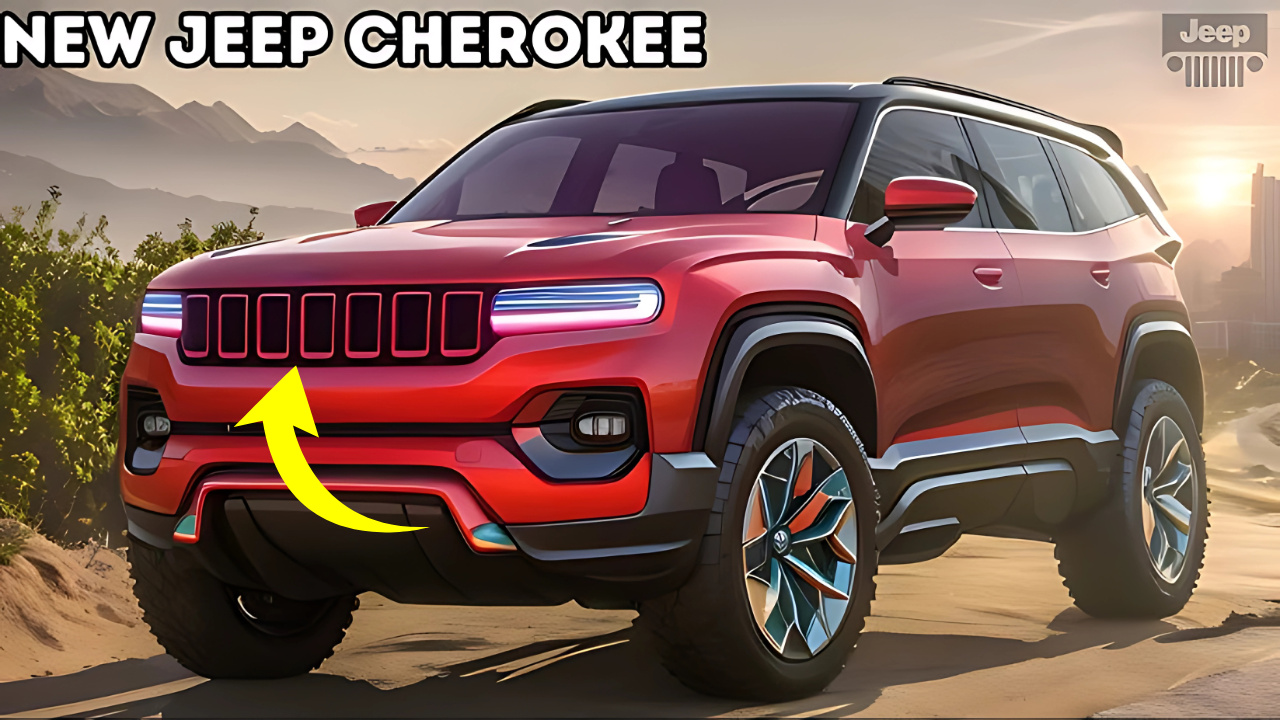The Jeep Cherokee helped mold the shape and direction of the modern American SUV. The automotive world is buzzing with anticipation as Jeep prepares to resurrect one of America’s most iconic SUV nameplates. After a three-year hiatus, the Cherokee badge is making a triumphant return with the 2026 model year, promising to address the shortcomings that plagued its predecessor while embracing the electrified future of transportation.
The jeep Cherokee name carries tremendous weight in automotive history. From its revolutionary beginnings in 1974 to its controversial discontinuation in 2023, this nameplate has experienced the full spectrum of success and failure. Now, as Jeep faces intense competition in the crowded midsize SUV segment, the 2026 Cherokee represents more than just another product launch—it’s a make-or-break moment for the brand’s credibility and market position.
Historical Context: Understanding the jeep Cherokee Legacy
The Golden Years
The Cherokee story began in 1974 when Jeep introduced a vehicle that would fundamentally reshape the American automotive landscape. The first-generation jeep Cherokee wasn’t just another SUV; it was a pioneering vehicle that demonstrated how rugged capability could coexist with everyday practicality. This original Cherokee established the template for what would eventually become the most popular vehicle category in America.
The second generation, launched in 1984, refined the formula while maintaining the Cherokee’s adventurous spirit. These early models earned legendary status among enthusiasts and established jeep Cherokee as synonymous with authentic American SUV engineering. The boxy, purposeful design and genuine off-road capability made these vehicles instant classics.

The Troubled Middle Years
However, the jeep Cherokee’s journey wasn’t without significant obstacles. The third and fourth generations suffered from a crucial branding mistake when Jeep inexplicably renamed the vehicle “Liberty” for the North American market. This decision severed the connection to the Cherokee’s proud heritage and confused consumers who had grown up with the nameplate.
The Liberty years, spanning from 2002 to 2012, represented a period of lost identity. While the vehicles themselves offered decent capability and reliability, they lacked the soul and recognition that made the Cherokee special. Sales suffered, and the brand lost valuable market share to competitors who maintained consistent naming strategies.

The Controversial Comeback
When Jeep restored the Cherokee name in 2014 for the fifth generation, hopes were high for a triumphant return. Unfortunately, the new Cherokee’s polarizing design language alienated many traditional customers. The pointed front fascia and unconventional proportions sparked fierce debate among enthusiasts and casual buyers alike.
Despite offering competitive interior space, fuel economy, and technology, the fifth-generation Cherokee never achieved the sales success Jeep anticipated. The controversial styling, combined with increasing competition from more attractive alternatives, gradually eroded the Cherokee’s market position.
The Business Case for jeep Cherokee’s Return
Sales Performance Analysis
The decision to discontinue the Cherokee after 2023 initially seemed logical from a purely numerical perspective. Sales figures told a sobering story: the Cherokee sold 40,322 units in 2022, dropping precipitously to just 24,609 units in 2023—a devastating 39% decline in a single year.
| Year | Cherokee Sales | Total Jeep Sales | Cherokee % of Total |
|---|---|---|---|
| 2022 | 40,322 | 681,055 | 5.9% |
| 2023 | 24,609 | 642,924 | 3.8% |
| 2024 | 0 | 587,725 | 0% |
However, the aftermath of the Cherokee’s cancellation revealed an uncomfortable truth: removing the model hurt Jeep’s overall performance more than anticipated. Total Jeep sales declined 9% in 2024 following the Cherokee’s departure, suggesting that many former Cherokee customers simply left the brand rather than upgrading to more expensive models.
Market Opportunity Assessment
The midsize SUV segment remains one of the most competitive and profitable areas of the automotive market. Vehicles like the Honda Passport, Ford Bronco Sport, and Toyota Highlander continue posting strong sales numbers, proving that demand exists for properly executed products in this category.
Jeep’s absence from this crucial segment has created a significant gap in their lineup. Customers seeking something larger than the Compass but more affordable than the Grand Cherokee have few options within the Jeep family. This gap represents lost sales opportunities and weakened dealer relationships.
Design Philosophy and Visual Evolution
Learning from Past Mistakes
The 2026 Cherokee’s design represents a fundamental departure from its predecessor’s controversial aesthetics. Early preview images reveal a more conventional, angular approach that aligns better with traditional SUV expectations while maintaining distinctive Jeep character.
The new Cherokee adopts a flatter, more upright front fascia reminiscent of the successful Grand Cherokee design language. This change addresses one of the most frequently cited complaints about the previous generation while creating better family resemblance across the Jeep lineup.
Proportional Improvements
Beyond the front-end redesign, the 2026 Cherokee appears to feature broader shoulders and a more squared-off body profile. These changes should give the vehicle a more substantial, confident presence while improving interior packaging efficiency.
The controversial “bulbous” rear end that characterized the previous generation has been replaced with cleaner, more geometric surfaces that better reflect contemporary design trends. This evolution should appeal to buyers who found the previous Cherokee’s appearance too unconventional.
Size and Positioning Strategy
Early indications suggest the 2026 Cherokee will be slightly larger than its predecessor, potentially addressing complaints about cramped third-row seating. However, it will still slot between the Compass and Grand Cherokee in Jeep’s hierarchy, maintaining its role as an accessible family SUV option.
Powertrain Revolution: Embracing Electrification
Hybrid Technology Integration
Perhaps the most significant change for the 2026 Cherokee is the confirmed inclusion of hybrid powertrains. This decision reflects both market trends and Jeep’s surprising success with electrified vehicles, particularly the Wrangler 4xe.
The Wrangler 4xe has become America’s best-selling plug-in hybrid vehicle, demonstrating that Jeep customers are receptive to electrified powertrains when they don’t compromise capability. This success provides a roadmap for the Cherokee’s hybrid implementation.
Expected Powertrain Options
While official specifications remain under wraps, industry sources suggest the 2026 Cherokee will likely offer the proven 2.0-liter turbocharged four-cylinder hybrid system that powers the Wrangler 4xe. This setup produces an impressive combined output of 375 horsepower while maintaining excellent fuel economy.
For customers preferring traditional gasoline power, the Cherokee will likely retain access to Jeep’s reliable 3.6-liter Pentastar V6 engine. This proven powerplant offers strong performance and towing capability while maintaining reasonable operating costs.
| Powertrain Option | Expected Output | Fuel Type | Target Audience |
|---|---|---|---|
| 2.0L Turbo Hybrid | 375 HP | Gas/Electric | Performance/Efficiency |
| 3.6L Pentastar V6 | 290 HP | Gasoline | Traditional/Towing |
| Base 4-Cylinder | 240 HP | Gasoline | Budget-Conscious |
Electrification Benefits
The hybrid system offers multiple advantages beyond improved fuel economy. The electric motor provides instant torque delivery, enhancing acceleration and towing performance. Additionally, the system enables silent electric-only operation for camping and low-speed maneuvering situations.
Competitive Landscape Analysis
Direct Competitors
The 2026 Cherokee faces fierce competition from established players who have capitalized on Jeep’s absence from the segment. The Honda Passport offers proven reliability and strong resale values, while the Ford Bronco Sport provides genuine off-road capability with modern amenities.
Toyota’s 4Runner, despite its aging platform, continues attracting buyers seeking uncompromising durability. The Chevrolet Blazer and Hyundai Santa Fe represent more contemporary alternatives with advanced technology and efficient powertrains.
Competitive Advantages
The Cherokee’s hybrid powertrain could provide a significant competitive advantage, as few rivals offer similar electrified capability. The Jeep brand’s authentic heritage and off-road credibility also differentiate it from more car-like competitors.
Pricing strategy will prove crucial for the Cherokee’s success. With an expected starting price around $31,000, the Cherokee should undercut premium alternatives while offering more capability than budget options.
Technology and Feature Expectations
Infotainment Evolution
The 2026 Cherokee will likely feature Jeep’s latest Uconnect infotainment system with wireless smartphone integration, over-the-air update capability, and enhanced voice recognition. These technologies have become essential for competing with tech-savvy alternatives.
Safety Integration
Modern safety features including automatic emergency braking, blind spot monitoring, and adaptive cruise control should come standard across the Cherokee lineup. These features are no longer optional in the competitive midsize SUV segment.
Off-Road Technology
True to Jeep’s heritage, the Cherokee should offer advanced terrain management systems, electronic differential locks, and hill descent control. These features differentiate Jeep products from car-based crossovers that prioritize on-road comfort over genuine capability.
Market Positioning and Pricing Strategy
Value Proposition
The Cherokee’s success depends on delivering authentic Jeep capability at an accessible price point. With the Grand Cherokee now positioned as a premium offering, the Cherokee must capture buyers seeking genuine SUV attributes without luxury pricing.
Trim Level Strategy
Expect multiple trim levels catering to different customer priorities. Base models will emphasize value and fuel economy, while higher trims will offer enhanced off-road capability, premium materials, and advanced technology features.
A potential “Trailhawk” variant could compete directly with the Honda Passport TrailSport and Ford Bronco Sport, offering enhanced ground clearance, skid plates, and specialized tires for serious off-road adventures.
Production and Launch Timeline
Manufacturing Considerations
Jeep hasn’t announced specific production locations for the 2026 Cherokee, but North American assembly seems likely given trade considerations and transportation costs. The choice of manufacturing facility will impact both pricing and availability.
Market Introduction
The 2026 Cherokee will likely debut as a 2026 model year vehicle, suggesting a late 2025 introduction. This timeline allows Jeep to incorporate lessons learned from competitor analysis while ensuring adequate dealer preparation.
Frequently Asked Questions
Q: Will the 2026 Jeep Cherokee be available with all-wheel drive?
A: Yes, all-wheel drive will likely be standard on most trims, with advanced 4WD systems available on off-road variants.
Q: How much will the 2026 Cherokee cost?
A: Expected starting prices around $31,000 for base models, with fully equipped versions reaching approximately $45,000.
Q: Will there be a plug-in hybrid Cherokee?
A: While not confirmed, Jeep’s success with the Wrangler 4xe suggests a plug-in variant is highly likely for the Cherokee lineup.
A Critical Moment for Jeep
The 2026 Cherokee represents more than just another product launch—it’s a referendum on Jeep’s ability to learn from past mistakes and adapt to changing market conditions. The combination of improved styling, hybrid powertrains, and competitive pricing creates a compelling package that could restore the Cherokee’s reputation.
Success requires flawless execution across all aspects of the vehicle, from initial quality to long-term reliability. Jeep cannot afford another Cherokee disappointment, making this launch one of the most critical in the brand’s recent history.
If executed properly, the 2026 Cherokee could reclaim its position as an iconic American SUV while attracting new customers to the Jeep brand. The stakes couldn’t be higher, but early indications suggest Jeep has learned valuable lessons from the Cherokee’s troubled recent past.
The automotive world will be watching closely when the 2026 Cherokee debuts, eager to see whether this legendary nameplate can rise from the ashes and reclaim its rightful place in American driveways.

